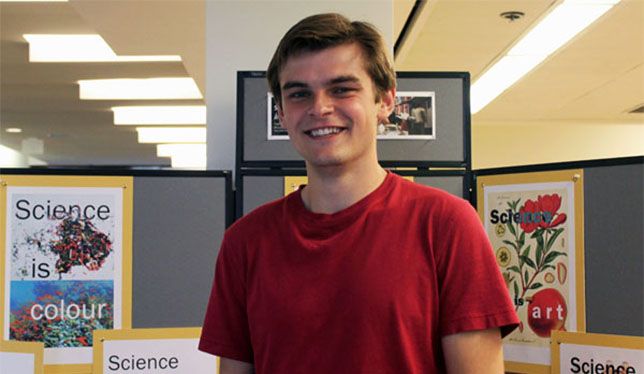On Nov. 12 last year, the European Space Agency landed a robot on a comet. It was a remarkable moment in the history of space exploration and scientific inquiry. The feat amounted to “trying to throw a dart and hit a fly 10 miles away,” said Jesse Hildebrand, a science educator and communicator. “The math and the physics behind that is mindboggling.”
Imagine Mr. Hildebrand’s disappointment then, as national news programs that night spent about half as much time reporting on the comet landing as they did covering Barack Obama’s gum-chewing faux pas in China. For Mr. Hildebrand, the incident perfectly illustrates why he founded Science Literacy Week, a Canada-wide public education campaign celebrating all things scientific.
From Sept. 21 to 27, several universities, libraries and museums will highlight the value of science in our contemporary world by hosting events and exhibits on topics ranging from the lifecycle of a honeybee to the science behind Hollywood films like Jurassic World and Contact.
Mr. Hildebrand began developing the campaign last year, shortly after graduating from the University of Toronto with a bachelor’s degree in ecology and evolutionary biology. He approached the U of T Libraries for support and “it really snowballed from there,” the 23-year-old said.
Last year’s inaugural Science Literacy Week involved four institutions limited to the Greater Toronto Area (York, U of T, the Mississauga Public Library and the Toronto Public Library). For the second edition, it has grown to 110 participating institutions across the country, including at least 30 universities. A partial list of events is available online.
At U of T, events will be hosted by science and engineering student groups, the Dunlap Institute for Astronomy and Astrophysics, U of T Scarborough, and the U of T Libraries. “We want to engage more with students and this seemed like the perfect opportunity,” said Heather Cunningham, manager of reference and research at U of T’s Gerstein Science Information Centre.
Ms. Cunningham said she supports the campaign not only because it encourages the university community to appreciate “the wonder of new discoveries, new ideas, new ways of thinking and [of] tackling problems,” but because it positions science literacy as a core competency.
“There’s so much information out there now and there’s so many conflicting stories, especially when it comes to certain topics like climate change or stem cell research or fluoridation of water,” she said. “You need to really be critical now more than before to assess the information that we hear to be able to separate facts from hype or startling headlines.”
For Sally Taylor, reference librarian at the Woodward Library at the University of British Columbia, hosting a robotics demonstration or setting up a popular science-book display drives home the message to science and engineering faculty and students the importance of effectively communicating their research. “It really does impact policy and decision-making,” she said. “In general, with the current government and all the damaging things that have happened to science and the federal science libraries across the country – of course those are things we care about.”
Though Mr. Hildebrand said Science Literacy Week wasn’t inspired by public criticism against the federal government’s approach to scientific research and communication, he admitted that it makes the campaign seem that much more important. “I’ve always wanted to shout from the rooftops how cool science is. This is my way of shouting from the rooftops,” he said.
In the lead-up to Science Literacy Week, museum scientists with the Alliance of Natural History Museums of Canada have been posting videos of what they do and why it’s important under the hashtag #canadalovesscience. The end of the campaign will coincide with a lunar eclipse and will see several universities and observatories hosting stargazing parties.
Selected events:
University of Toronto, U of T Science and Engineering Engagement
How does the science in Jurassic World really stack up? (Sept. 21)
Watch a screening of the summer blockbuster movie at the Bloor Hot Docs Cinema and stay for a discussion with paleontologists David Evans and Robert Reisz.
Memorial University, Ocean Science Centre in Logy Bay
Ocean Science Open House (Sept. 21)
Get hands-on with the salt water touch tank, and take in the centre’s aquarium and seal visitors deck.
McGill University, Schulich Library
Visit the library beehives (Sept. 23)
Check out the beehives on the roof of the Schulich Library/Frank Dawson Adams building, in the company of an experienced beekeeper. Participants will see the beekeeper open up the hive and inspect a honeycomb, and will learn first-hand about the organisation of a colony of bees. (The protective bee suit offered to each participant might be worth it alone).
University of Alberta Observatory
Solar Viewing (Sept. 24)
View the Sun through the observatory’s safe solar filtered telescopes. Keep an eye out for sunspots, filaments, or prominences.
University of British Columbia, Woodward Library
Hands-on Science! (Sept. 24)
Robots, 3D printing, biological specimens – come get up close to it all with staff from the Beaty Biodiversity Museum, Let’s Talk Science, Engineering Physics, Open Robotics and UBC Rapid.
McMaster University, Institute for Applied Health Sciences Building
Learn Cryptography Basics (Sept. 24)
Cryptography, the practice and study of techniques for secure communication, comprises math, computer science and electrical engineering. Learn about basic cryptography tools and how to stay secure on your own device.
